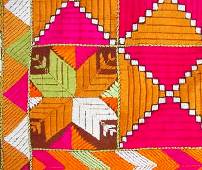 Just a few years ago, Jasbir Kaur (45) of Thuha village in Patiala district could not have dreamt of becoming economically independent at the age of 40.
Just a few years ago, Jasbir Kaur (45) of Thuha village in Patiala district could not have dreamt of becoming economically independent at the age of 40.
Today, as skilled embroiderers, she and many other women of her village command the respect of male members of their families.
Her companions Suresh Rani and Pratibha Rani were even worse off, being wives of migrant labourers from Bihar and Haryana.
They now boast of Permanent Account Numbers and file Income Tax returns, and are training other women, having acquired expertise in the intricate threadwork.
Jasbir Kaur, Suresh Rani and Pratibha Rani are among 3,000 women in Punjab, organised into 50 self-help groups, who have earned recognition at various national and international forums for propagating 'phulkari', the state's traditional hand embroidery.
The handicrafts made by these rural women have even been exhibited in Malaysia, Bahrain and China at the invitation of the governments of these countries.
The exercise was started in 1994 by Patiala-based artist Rekha Mann to experiment with new designs in phulkari and make it a contemporary form of embroidery.
The Patiala Handicraft Workshop Cooperative Society was registered in 1997 with the Punjab Cooperative Society.
Once registered, there was a deluge of proposals from the National Bank for Agriculture and Rural Development, Small Industries Development Bank of India and the Union ministry of MSME to run entrepreneurial development courses across Punjab to empower rural women.
The fact that banks in Punjab were looking for well-organised NGOs to lend money to helped Mann to reap the benefits of a variety of government schemes for rural artisans.
Over 200,000 women are engaged in phulkari work in Punjab.
But in the absence of a marketing network, they do not earn a decent living.
The Adalat Bazar area of Patiala has been the focal point of this handcraft since Partition, and the shopkeepers dictate their terms to both artisans and buyers.
The artisans associated with the PHWCS started earning three times more than what they made from the unorganised market.
Continuous research and development in colour
The final shot in the arm came in 2006, when the Khadi and Village Industries Commission shortlisted the group of women for Scheme for Regeneration of Traditional Industry.
With a grant of Rs 10 million and panchayat land in Thuha village, the society runs a common facilitation centre.
The rural women get training in embroidery and are taught the latest trends in this craft.
With the help of state-of-the-art machines provided at the centre, the rural entrepreneurs also stitch embroidered dresses and sell them in the open market.
The society gets bulk orders from institutions too.
One source of satisfaction is the acceptance of designs by organisations such as the National Institute of Fashion Technology, Ahmedabad, and Weavco (Punjab State Handloom Weavers Apex Cooperative Society Limited).
"We created designs for curtains and cushion covers for Weavco, and these were meant for the international market," said Mann, who is also the head of SFURTI Phulkari Cluster Project.
The phulkari cluster of Punjab is now one of the 79 clusters in India created under the Cluster Development Programme being implemented since 2007.
The diversification of the art has been achieved by weaving coloured thread on articles like wallets, file folders, cushion covers, curtains, hand fans and mobile covers, as there is demand for them in the international market.
"We have been designing for other agencies for export, but have now decided to carry out direct exports. We are getting queries through our website and are in the process of negotiating a deal," Mann said.
The cluster has not only led to the conservation of an art that was languishing due to lack of patronage, but also empowered rural women and given them access to health projects and insurance programmes run by the Union government.







 © 2025
© 2025